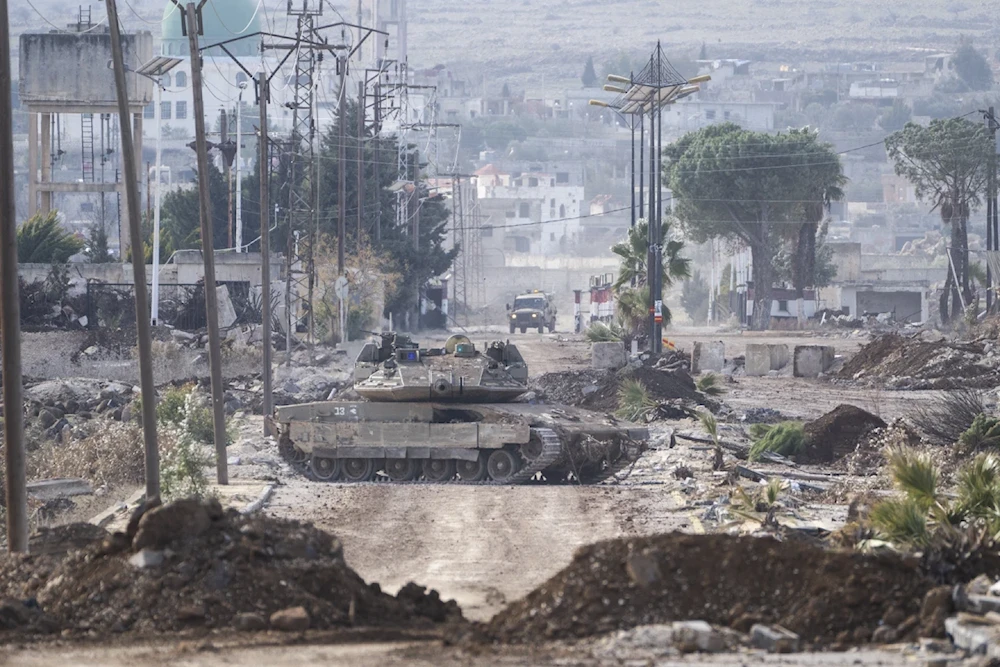Syria is free, 'Israel' get out: Frustration grows in Quneitra
Quneitra residents have reported that Israeli invading forces have demolished homes and prevented farmers from accessing their fields in certain areas.
-

Israeli military armored vehicles block a road leading to the town of Quneitra, Syria, Sunday, January 5, 2025 (AP)
A main road in the provincial capital of Quneitra, located in southern Syria, was blocked by piles of dirt, toppled palm trees, and a metal pole that seemed to have once been a traffic light. Beyond the barricades, an Israeli tank could be seen maneuvering down the street.
Israeli invading units entered the area—part of a UN-monitored buffer zone in the occupied Golan Heights, created by a 1974 ceasefire between Syria and "Israel"—shortly after President Bashar Assad’s fall last month.
The Israeli military has also made incursions beyond the buffer zone into Syrian territory, provoking protests from residents, who reported that Israeli invading forces have demolished homes and prevented farmers from accessing their fields in certain areas. On at least two occasions, Israeli troops opened fire on protesters.
Residents of Quneitra, a rural region filled with small villages and olive groves, expressed frustration over both the ongoing Israeli advances and the inaction from Syria's new leadership as well as the international community, according to the Associated Press.
Frustration grows in Quneitra as residents decry Israeli advances
Rinata Fastas told AP that Israeli invading forces had raided local government buildings but had not yet entered residential areas. Her home is located just inside the newly barricaded zone in the provincial capital, which was formerly known as Baath City, named after al-Assad’s ruling party, and is now called Salam City.
She expressed concern that Israeli troops might push further into the region or attempt to permanently occupy the territory they’ve already seized. "Israel" continues to occupy the Golan Heights, which it captured from Syria during the 1967 war.
It is worth noting that the international community, excluding the US, considers the Golan to be occupied.
"But why is no one in the new Syrian state coming out and talking about the violations that are happening in Quneitra province and against the rights of its people?" Fastas questioned.
The United Nations has lately accused "Israel" of breaching the 1974 ceasefire agreement by entering the designated buffer zone.
Israeli Prime Minister Benjamin Netanyahu stated that Israeli troops will remain in the area "until another arrangement is found that will ensure Israel’s security." He made the remarks from the snow-covered summit of Syria’s tallest mountain Mount Hermon [Jabal al Sheikh], which is now under Israeli control.
In response, the new Syrian government has formally complained to the UN Security Council regarding Israeli airstrikes and territorial incursions into Syria.
'Israel' shot 6 Syrians during peaceful protests
In the village of Dawaya, located outside the buffer zone, 18-year-old Abdelrahman Khaled al-Aqqa lay on a mattress in his family home on Sunday, still recovering from gunshot wounds to both legs, AP reported. Al-Aqqa shared that he joined around 100 locals on December 25 to protest against the Israeli incursion, chanting, "Syria is free, Israel get out!"
“We didn’t have any weapons, we were just there in the clothes we were wearing,” he said. “But when we got close to them, they started shooting at us.”
Six protesters were reported wounded, according to local residents and media reports. Another man was injured on December 20 in a similar incident in the village of Maariyah. The Israeli army claimed at the time that the man was shot after approaching rapidly and ignoring calls to halt.
Adel Subhi al-Ali, a local leader, sat beside his 21-year-old son, Moutasem, who was recovering after being shot in the stomach during the December 25 protest. Initially taken to a local hospital that lacked the resources to treat him, Moutasem was later transferred to Damascus, where he underwent surgery.
When he saw the Israeli tanks advancing, al-Ali told AFP, "We felt that an occupation is occupying our land. So we had to defend it, even though we didn’t have weapons... It is impossible for them to settle here."
Al-Ali called on the international community to “pressure Israel to return to what was agreed upon with the former regime,” referring to the 1974 ceasefire agreement and to return the Golan Heights to Syria.
Read next: 'Matter of time' before IOF in Golan attacked: Israeli media

 4 Min Read
4 Min Read








